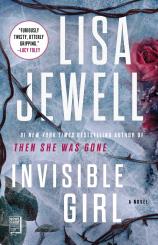Reading Group Guide
Discussion Questions
Invisible Girl

1. INVISIBLE GIRL is told from three perspectives: Saffyre, Cate and Owen. Was there one character in particular whose point of view you were intrigued by? How might you have felt about these characters had you not been provided with a first-person account of their lives? Why do you think Lisa Jewell structured her novel this way, and chose these people specifically to focus on?
2. We are first introduced to the character of Owen through the Fours’ daughter Georgia, who describes him as “creepy” (page 7), and later says he looks “totally rapey” (page 28), despite never having interacted with him. We only hear from Owen himself nearly 60 pages into the novel, at which point he has already been called “creepy” three times. What did you think of Owen after actually having met him? As the novel unfolded, what descriptive details about him did you feel fit the stereotypically “creepy” bill? Do you think that Georgia’s first reaction was justified?
3. One theme of the book is the role that childhood trauma plays out in teenage and adult lives. In what ways have Saffyre’s assault and Owen’s abandonment influenced their current behavior and interpersonal relationships? How do they each confront and work through the lasting psychological effects over the course of the novel?
4. INVISIBLE GIRL takes place in a quiet, posh neighborhood occupied by mostly large, security-gated houses. One standout location is the empty plot of land where a house has been torn down and never rebuilt --- what Cate calls a “dark, private void” (page 9). For Cate, it represents potential lurking danger and the unknown; for Saffyre, it represents freedom; for Josh, friendship. Compare and contrast these characters’ ideas of this in-between space and the neighborhood in general. Where do their feelings stem from? How might age, gender and other life circumstances affect this? Why do you think the author chose this setting? How does it move the plot along?
5. INVISIBLE GIRL is filled with complicated familial and romantic relationships. When asked by Roan to describe what love feels like, Saffyre identifies two different kinds: one that involves need (“It feels like need.... Like you love someone because they give you what you need” (page 49), and one that does not, and is “pure.” Using this dichotomy, can you identify the different types of love that appear in this novel? Do both parties seem to be in agreement about the nature of their relationship?
6. Appearance --- whether in the sense of physical attractiveness or more general presentation --- is a big theme in INVISIBLE GIRL, but the way that it applies to men and women is different. Saffyre says, “When you’re pretty everyone just assumes you must have a great life” (page 4). Owen obsessively categorizes women as good-looking or not and shapes his interactions accordingly, often paralyzed by “extreme female beauty” (page 107). Are there any instances of men being evaluated or interacted with in the same way? What is it that’s so enticing or dangerous about the idea of a beautiful, carefree woman in the context of the novel?
7. While most people find sanctity in their own homes, Saffyre is very connected to the outdoors: “I needed the air on my skin. I needed trees and soil and damp and moonlight and daylight and sun and wind and pigeons and foxes. It was like I was becoming feral” (page 168). She later says, “By night I was a kind of nocturnal animal, like the human equivalent of a fox” (page 264). What does it mean to Saffyre to become feral, beyond sleeping outside? What is it that draws her to the fox, specifically?
8. Though the title of this novel refers to Saffyre, many different characters experience both invisibility and anonymity. For Saffyre, being invisible provides a respite from the eyes of her classmates, a kind of safety. Cate feels entirely unseen by Roan, free of having to reconstruct her marriage, but ignored. Owen feels forgotten. Bryn hides behind relative anonymity on incel platforms. Is there a difference between invisibility and anonymity? How might these states be viewed as positive or negative? How did each character’s perspective on the idea of invisibility or anonymity help you understand them and their motivations?
9. Cate, as seen through Owen and Saffyre’s eyes, is little more than a betrayed housewife. Owen wonders, “What do women like this think about...when it’s just them, and the kids are in bed, and they’ve got one of those gigantic fishbowls of wine in their hands? What are they when they’re not at the gym or collecting their children from school? Where do they exist on the scale of humanity? He cannot imagine” (page 64). Saffyre, upon learning of Roan’s cheating, has a similar train of thought: “What happens to a woman like that with a pretend job and children just about to leave home? Where would Cate Fours end up?” (page 124) Though one of these inquiries is more steeped in sexism, together they raise questions about Cate’s autonomy. How does Cate ultimately end up taking control of her life and regaining what she calls the “moral high ground” in light of Roan’s infidelity? Do you think she defies the well-worn stereotype? Do you think hers could be considered a heroine arc?
10. Though there are references to Roan slipping away and being unreachable for suspicious hours at the beginning of INVISIBLE GIRL, he is not more directly suggested to be involved in the assaults until later in the novel. What about Roan’s character made these initial hints seem negligible? Were you surprised by the anger and condescension he displayed when Cate first asked him about Saffyre’s time in his care? How would you compare his sudden outbursts and rage to Owen’s? How does their disrespect for women manifest in each man’s behavior? Why do you think Owen is featured more prominently, and is given a first-person voice, whereas Roan is not?
11. Cate treats her son and daughter differently when it comes to matters of safety and privacy; “for some reason her son’s privacy seems more sacred, more fragile than her daughter’s” (page 117). While she talks frankly about the potential that Georgia could be violated, she feels so removed from Josh’s inner life that at one point she fears that he has been the neighborhood perpetrator all along. How do you think we should change the way we parent by gender, especially in adolescence? Are there conversations that should be had separately with teenagers of different genders, or should everyone be presented with the same information?
12. Do you think that INVISIBLE GIRL takes a firm stance on whom we as a society might owe a second chance at fair judgment? What do you think keeps Owen from being fully sucked into the incel community and becoming a Bryn-like figure, who concludes the book as a declared terrorist threat? By the novel’s end, how did you feel about each of the characters we have watched flounder morally?
Invisible Girl
- Publication Date: June 1, 2021
- Genres: Fiction, Psychological Suspense, Psychological Thriller, Suspense, Thriller
- Paperback: 384 pages
- Publisher: Atria Books
- ISBN-10: 1982137347
- ISBN-13: 9781982137342







